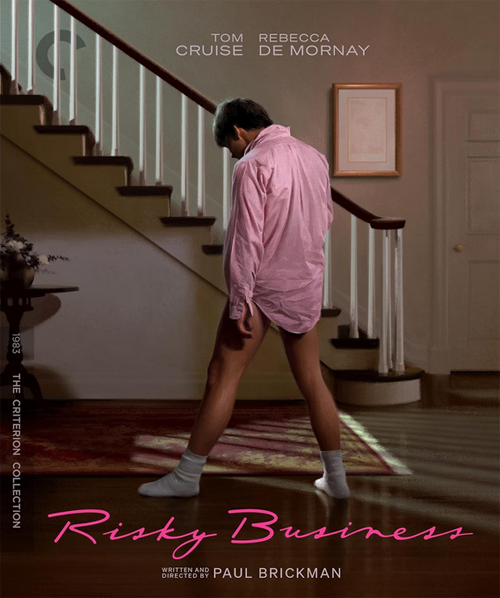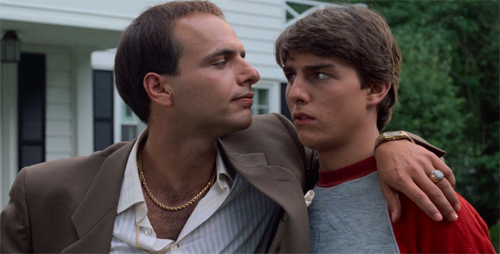
“THE
DREAM IS ALWAYS THE SAME”
By
Raymond Benson
One
of the hallmark and influential pictures of the early 1980s was Paul Brickman’s
Risky Business, which is also known for arguably making Tom Cruise a
star overnight. Upon its release in 1983, this coming-of-age comedy-drama that
many critics compared to the likes of The Graduate (1967) captured the
zeitgeist of the era. It capitalized on the MTV sensibilities that made music
videos a part of mainstream Hollywood movies, and yet it also managed to
display a fine artistic aesthetic that elevated the picture above what was
thought of as a “teen movie.”
Brickman,
who had enjoyed some success as a screenwriter (e.g., Handle With Care,
aka Citizens Band, 1977), wrote the original script of Risky Business
and decided that he was the only person who could direct it. He found,
though, that studios were lukewarm at the idea of a first-time director doing a
teen comedy with no bankable star, and especially with material that was edgier
and intellectually superior when compared to something like the popular but
crude Porky’s (1981).
Enter
producer Jon Avnet, who had known Brickman for years. Avnet was able to get the
script to David Geffen’s production company. Geffen was willing to give the
film a go if they had the right cast. Brickman, Avnet, and casting director Nancy
Klopper spent months auditioning young actors and quickly found most of the
supporting cast. The two leads, however, were a challenge. Tom Cruise came in
to audition while filming Coppola’s The Outsiders (also 1983). When he showed
up, the actor had slicked-back hair and the black leather jacket look. This was
totally wrong for the character of Joel Goodsen, the high school senior with
big ambitions to be a successful capitalist. But with a little change of
hairstyle, clothing, and attitude, Cruise proved to be perfect. For the role of
the high-class hooker, Lana, the discovery of Rebecca De Mornay was more
difficult. Eventually she was found because Harry Dean Stanton, a friend of
Avnet’s, had noticed her as an extra in yet another Coppola production, One
from the Heart (1982). De Mornay got the part.
Joel
Goodsen (Cruise) is an accomplished high school student in a wealthy Chicago
suburb. He wants to get into an Ivy League college like Princeton after he
graduates. His parents go out of town for a week, leaving him in charge of the
home. Being a horny all-American 17-year-old, he’d like to have a bit of fun,
too. His buddy Miles (Curtis Armstrong) arranges for a call girl to visit Joel.
The first one to arrive comically doesn’t work out, but the second, Lana (De
Mornay), is the jackpot. Joel and Lana begin a hot, surreal relationship.
Everything is rosy until Lana’s jealous pimp, Guido (Joe Pantoliano),
interferes. The theft of Joel’s mother’s expensive Steuben glass egg, the
wrecking of his father’s Porsche, and threats of violence from Guido sends Joel
into a spiral of crises. On top of all that, a recruiter from Princeton
(Richard Masur) arrives to make an assessment of the college candidate. To
reveal more would spoil the fun.
One
of the smartest things Brickman did was to hire Tangerine Dream to do much of
the score. The band’s ethereal, synthesizer-based material is perfect for the
dreamlike sequences that occur throughout the film, especially in the R-rated
sex scenes between Joel and Lana. The movie may have been classified as a “teen
comedy,” but make no mistake—this was a movie not for teens, but rather for
grownups. The rest of the score was made up of licensed pop songs, including
Bob Seger’s “Old Time Rock and Roll,” which accompanies perhaps the most iconic
scene of the movie—Cruise lip syncing and dancing in his underwear while alone
in the house.
One
can look back today and criticize the movie for all kinds of #MeToo and politically
incorrect content, but in 1983 no one seemed bothered. The movie was a hit. While
some of the plot might have raised eyebrows even then, none of it was
unrealistic. Just as The Graduate shone a light on the hypocrisies of
American society, so does Risky Business. It’s a satire, albeit a
cynical, ironic one, that is an indictment of American capitalism and the drive
to attain monetary success (and this was such a thing in the early 1980s).
This theme truly hits home when one views Brickman’s “director’s cut,” which
features an entirely different ending than the one that was released
theatrically. In fact, Brickman was apparently so bitter and unhappy about the
studio forcing him to slap on an “upbeat” ending just before release, that he
directed only one other feature in his career. Brickman stuck to screenwriting,
and it’s a shame, because Risky Business exhibits a genius-at-work.
The
Criterion Collection’s new 4K UHD/Blu-ray Combo pack features new 4K digital
restorations of the director’s cut, presented for the first time as a whole, and
the theatrical cut, supervised and approved by Brickman and Avnet, with 5.1
surround DTS-HD Master Audio soundtracks. The images are marvelously crystal, representing
the best presentation of the film to date. Note that previous Blu-ray releases
of the film included the alternate director’s cut ending as a supplement, but
it wasn’t attached to the complete film. Here, you can see Risky Business as
the filmmakers meant it to be seen. This reviewer can easily say that this is a
case in which the “director’s cut” is indeed better than the theatrical one.

The
previous 2008 Warners release of the theatrical cut contained an excellent video/audio
commentary from Brickman, Avnet, and Tom Cruise. Disappointingly, the Criterion
presentation of the theatrical cut contains only the audio commentary, not the
video component.
Supplements
included are a port-over of the half-hour documentary on the film’s making,
“The Dream is Always the Same,” from the previous release; new interviews with
Jon Avnet and casting director Nancy Klopper; a new conversation between editor
Richard Chew and film historian Bobbie O’Steen; screen tests with Cruise and De
Mornay (ported from the previous release); the theatrical trailer; and English
subtitles for the hearing impaired. The booklet contains an essay by film
curator and critic Dave Kehr.
Risky
Business is
an important 1980s gem that is certainly for fans of Tom Cruise, but it’s also
for cinephiles who appreciate the cinematic aesthetics of its time.
Click here to order from Amazon